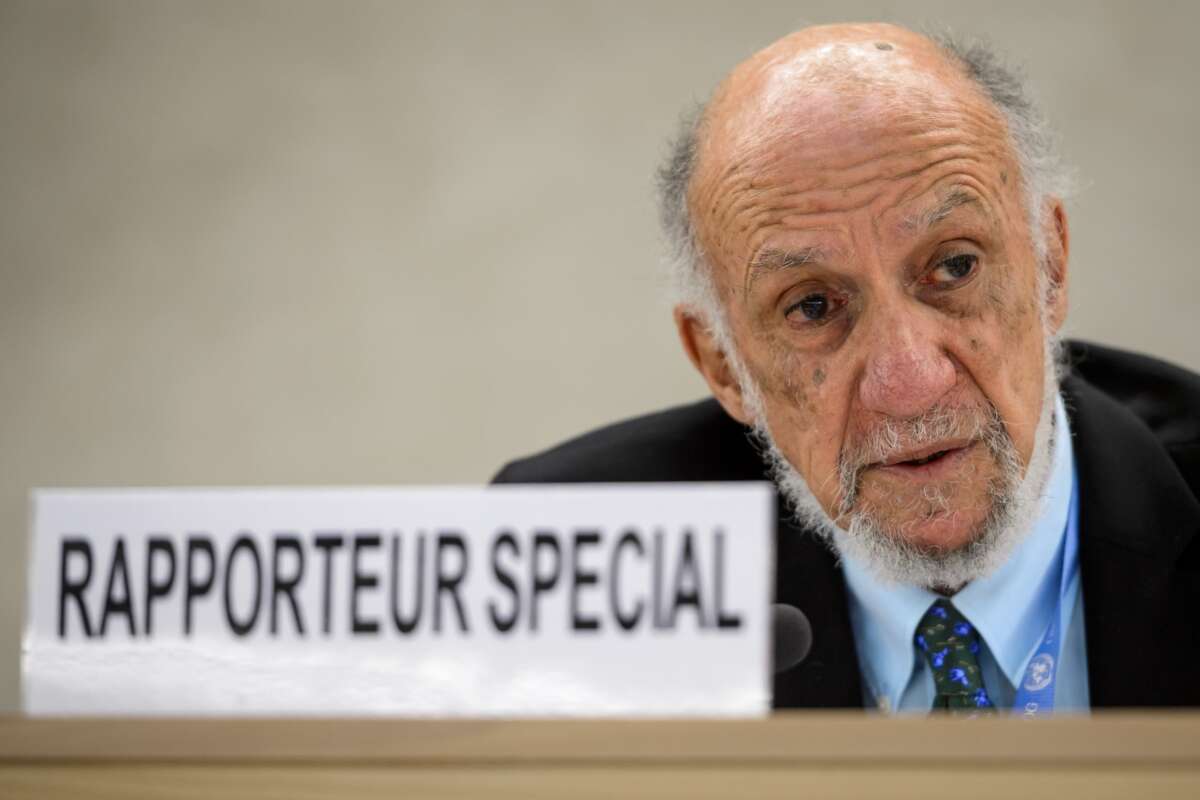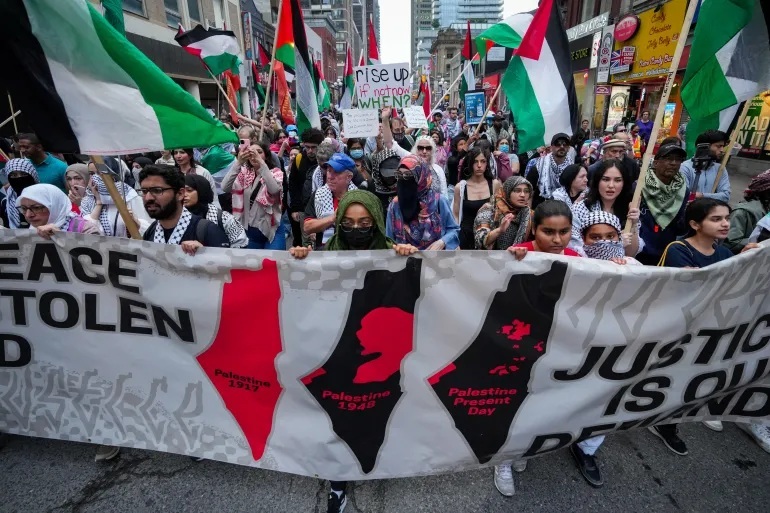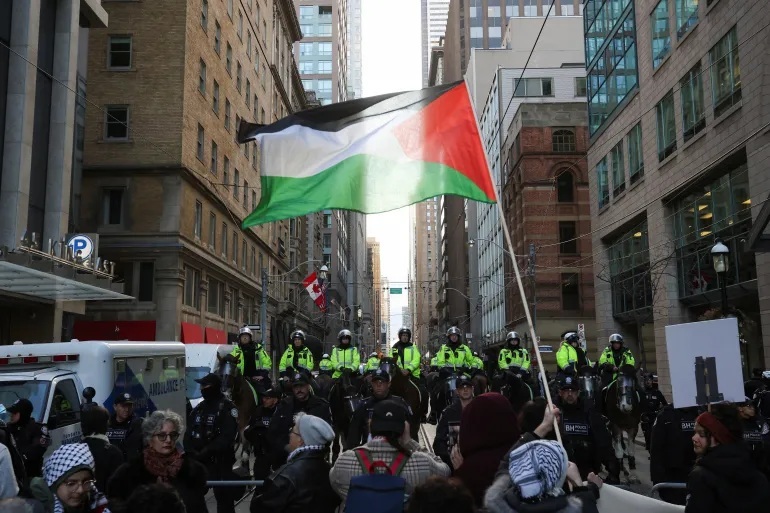Behind the Scenes of Falk's Interrogation: An Unspoken Battle Between Diplomacy and Free Speech in Canada
TEHRAN (Defapress) - In the heart of Canada's political winter, where borders are not merely geographical but also ideological gatekeepers, the interrogation of 95-year-old distinguished scholar and former United Nations Special Rapporteur on Palestinian human rights, Richard Falk, has become a symbol of the country's democratic contradictions. Falk, who for years has been a voice for oppressed Palestinians against Israel's systematic violations, was stopped on Thursday at Toronto's Pearson International Airport and subjected to over four hours of security questioning.

Canadian officials informed him and his wife, Hilal Elver, a prominent legal scholar, that their presence was considered "a danger to Canada's national security." This incident, seemingly a simple border inspection, has opened a window into the depths of the government's concerns about critical voices and has ignited the anger of human rights activists.
The four-hour interrogation of the former UN rapporteur
The image of Falk, a man with white hair and eyes full of experience, on the verge of 96, being interrogated at Canada's cold borders instead of resting, is a jolt to Canada's public conscience. In an interview with Al Jazeera, he said that agents questioned him about his activities regarding Gaza, Israel, and genocide, specifically grilling him about his attendance at an event reviewing Canada's role in Israel's war on Gaza.
This treatment has sparked a wave of anger among Canadian activists, raising cries for accountability from the highest levels of government. Corey Balsam, National Coordinator of the group Independent Jewish Voices Canada, which defends Palestinian rights, said with a voice full of anger and distress: "We need answers from the highest levels of government."
He warns that such behavior sends a frightening message: "None of us are safe from the suppression of protest and the pressure on voices that criticize the Israeli regime." Balsam emphasizes that this incident casts a frightening shadow over all Canadians who dare to speak about human rights, particularly in Palestine.

The heavy silence of the Canadian government
Despite this barrage of protests, Canadian officials have so far remained silent. However, the office of Public Safety Minister Gary Anandasangaree, who oversees the Canada Border Services Agency (CBSA), confirmed the incident in a statement to Al Jazeera and promised to follow up.
Simon Lafortune, a spokesman for the minister, wrote in an email: "National security measures are an inseparable part of our immigration and border management framework, and while we cannot comment on specific cases, we are committed to ensuring our border screening processes respect legal procedures and international obligations."
He added that the minister has requested that the CBSA provide more precise details on how this incident occurred. However, these promises are not enough for critics; they want to know why a 95-year-old man, who has fought for peace for years, is considered a security threat.
Alex Neve, Senior Director of Strategy and Parliamentary Affairs for the group Canadians for Justice and Peace in the Middle East, described this treatment as "utterly ridiculous." He told Al Jazeera: "This makes it clear to everyone that the government wanted to disrupt the court's work and cover up Canada's complicity in Israel's genocide." Neve points out that Ottawa has repeatedly avoided accountability for its role in arming Israel.
Since the start of the Gaza war in October 2023, Canadian human rights activists have pressured the government to put pressure on its long-time ally, Israel, and to stop the attacks on Palestinians. These pressures have intensified with the worsening humanitarian crisis in Gaza due to restrictions on aid delivery and incessant killings.

The Canadian government's insufficient actions in support of the Palestinians
Last year, Canada suspended export permits for some weapons to Israel due to that regime's crimes against innocent Palestinian people. Mark Carney, Canada's new Prime Minister, who just came to power in March, has opposed Israel's blockade and obstruction of aid access for the people of Gaza, and the increase in military violence and settlements in the occupied West Bank.
Also, in September, the Carney government, along with its allies, recognized the State of Palestine. However, researchers and human rights activists warn that loopholes in Canada's weapons export system have allowed Canadian-made weapons, mostly through the United States, to continue to be exported to Israel. Protesters are urging Ottawa to do more to curb Israel's ongoing attacks against Palestinians in Gaza and the West Bank and to support legal pursuits, including at the International Criminal Court.
Falk, who was the UN Special Rapporteur on the situation of human rights in the Palestinian territories occupied since 1967 from 2008 to 2014, sees this interrogation as part of a "climate of state insecurity" and called it an attempt to silence the voice of Gaza's truth. Al Jazeera contacted several Canadian government agencies to ask whether Ottawa truly views this elderly man as a security threat, and if so, why?
Rebecca Purdy, a spokeswoman for the Canada Border Services Agency, responded in an email that the agency cannot comment on specific cases, but that secondary inspections are part of the border process. She emphasized: "Secondary inspections are part of the cross-border process. It is important to note that travellers referred for a secondary inspection are not detained. Foreign nationals seeking entry to Canada may be subject to a secondary examination by an officer to determine their eligibility to enter Canada. In some cases, the examination may take longer due to information gathering through questioning." However, Global Affairs Canada has not yet responded.
This incident is more than a border event; it is a warning bell for freedom of expression in Canada. Balsam warns that "We all deserve answers and an explanation; this event casts a dark shadow over all who dare to express an opinion." Falk and Elver, both American citizens, were allowed entry after four hours of interrogation and attended the court, but the question remains: How long will Canada's borders remain walls for silencing the truth?
In the end, this is not just the story of an interrogation, but a narrative of the battle between the true definition of security and humanity; a battle that places Canada in the mirror of truth.
